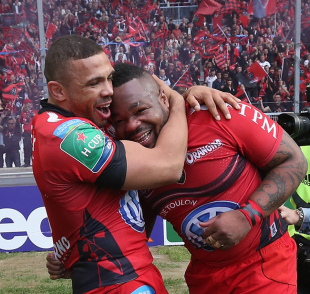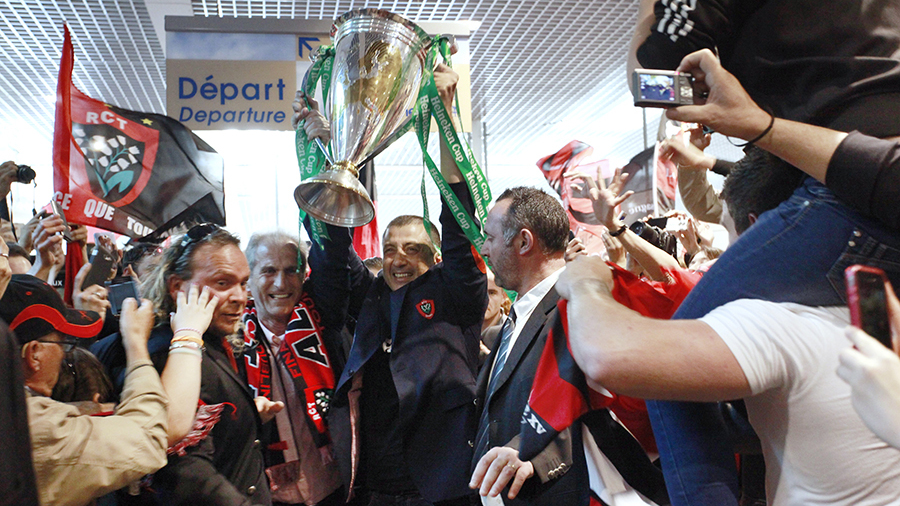|
Heineken Cup
The building of Europe's new rugby dynasty
Paul Eddison
May 23, 2014

Toulon's Bryan Habana and Mattheu Bastareaud celebrate victory over Munster in the Heineken Cup
© Getty Images
Enlarge
Everything changed for Toulon in May 2006. That was the moment that Mourad Boudjellal decided it was time to take his home-town team back to the big time. The three-time French champions had just endured one of the poorest seasons in the history of the top flight, winning only three games all season and losing ten league matches at their Stade Mayol. Six times they conceded a half-century of points and the only question is whether the greater embarrassment came in the 65-0 loss at Montpellier or the 50-21 home defeat to Agen on the final day. From the ashes of that total humiliation has risen a team that in the next fortnight could establish itself as Europe's next rugby dynasty. Only Leicester and Leinster have ever won back-to-back Heineken Cups, and only Toulouse have claimed the Bouclier de Brennus and European titles in the same year, all the way back in 1996. Over the next nine days Toulon have the chance to join both those select groups, first defending their European crown against Saracens before the opportunity for revenge against Castres in a repeat of last season's Top 14 final. With their blockbuster squad full of World Cup winners and international superstars, it's easy to peg Toulon as the proof that money can buy success but it was not always so easy. Boudjellal's first season as president saw the first signs of his ambition, with Tana Umaga headlining a recruitment drive that also included British Lions Rob Henderson and Dan Luger, French international pair Yann Delaigue and Jean-Jacques Crenca, and Argentine sharpshooter Gonzalo Quesada. Still, that star power was not enough to secure an immediate return to the Top 14, with a semi-final loss to La Rochelle showing Boudjellal how much was still left to do.
Undeterred, he brought in a quartet of superstars from the Southern Hemisphere, George Gregan, Andrew Mehrtens, Anton Oliver and reigning World Player of the Year Victor Matfield. Umaga moved from skipper to player-coach and Boudjellal achieved his first ambition of restoring Toulon to the top flight a year later. The club, who had won their last title in 1992 by beating Serge Blanco's Biarritz in his final ever game, were one step closer to ending their long wait for a French championship. On their return to the Top 14 Toulon brought in two new players who would have an impact on the club every bit as great as Umaga. If the former All Black skipper was the first superstar of the Boudjellal era, Sonny Bill Williams was arguably more high-profile, arriving fresh from an acrimonious switch of codes and bringing with him an offloading game which has still not been matched on the French Riviera, or arguably anywhere in Europe. While Sonny Bill grabbed all the headlines, Springbok Joe Van Niekerk's arrival was just as influential, and as he prepares to call time on his career, it's worth pointing out that Big Joe is one of only two players to have been with Toulon in the six seasons since promotion. That year Toulon comfortably beat the drop, and even attracted 60,000 fans to the Stade Vélodrome in Marseille for a historic win over Toulouse. This rugby-mad town was on its way back to the big time, and the fans were turning up in their droves. For Boudjellal the gamble was beginning to pay off. According to the saying, in Toulon when the rugby is going well, the city goes well. And having suffered the election of a National Front (FN) mayor in the late 90s, Toulon was starting to move away from that sort of radical politics.
While politics and rugby don't always mix, they are part of Boudjellal's story. A former socialist campaigner, when he first took charge he laid out his intention "to give the club a positive image to all those who voted for the FN." His outspoken nature may not have won over everybody in the world of French rugby, but in the town itself the fans are forever grateful for Boudjellal's intervention. The arrival of Jonny Wilkinson in 2009 marked the next step for Toulon, as they went from big spending novelty to genuine contenders for titles. However the initial results were not resounding successes; an Amlin final loss to Cardiff in Marseille in 2010 was followed by the same result two years on to Biarritz, while they also fell to Toulouse in a first Top 14 final in two decades. By now Bernard Laporte was the man in charge, having taken over after an underwhelming spell for Philippe Saint-André, who himself had replaced Umaga. Faithful to his rugby philosophy Laporte built his team around a powerful pack and Wilkinson, the ten he dreamed of having during his eight years as France coach. The reward finally came last year when Delon Armitage's try and Wilkinson's boot helped Toulon to Heineken Cup glory against Clermont, but even then the feeling was that the better team on the day lost. That is arguably the biggest change this year. Win or lose their next two games, no one who watches the Top 14 regularly could argue that Toulon are not now the dominant club in the French game, if not the European game. Boudjellal has built his squad of galacticos, even explaining this week how a privately set-up company pays a six-figure contribution to Wilkinson's salary through a legal loophole to help the club stay under the €10M salary cap. At the same time the Toulon academy has begun to produce a generation of players who are fighting for game time with the superstars. Players like Virgile Bruni and Xavier Chiocci have shown the way and others should follow. But while the academy grows there is still a way to go - the most famous recent products are Gaël Fickou and Yoann Maestri who both had to move to Toulouse to get the requisite game time to earn international honours. Boudjellal claims that the club is now self-sufficient, with his last major financial investment coming three years ago, meaning he could walk away in a way that Roman Abramovich or other footballing billionaires never could. Whether he will is another story, but you can be sure that he will be very visible over the next nine days as Toulon begin the most important week in this latest chapter of their history. 
Toulon's fiercely passionate president Mourad Boudjellal holds the Heineken Cup aloft © Getty Images
Enlarge
© ESPN Sports Media Ltd
| ||||||||||||||||||||||||||||||
Live Sports
Communication error please reload the page.
-
Football
-
Cricket
-
Rugby
-
- Days
- Hrs
- Mins
- Secs
F1 - Abu Dhabi GP
Abu Dhabi Grand Prix December 11-131. Max Verstappen ()
2. Valtteri Bottas (Mercedes)
3. Lewis Hamilton (Mercedes)
4. Alexander Albon ()
5. Lando Norris ()
6. Carlos Sainz Jr ()
-
ESPNOtherLive >>
Snooker - China Open
Tennis - Miami Open

